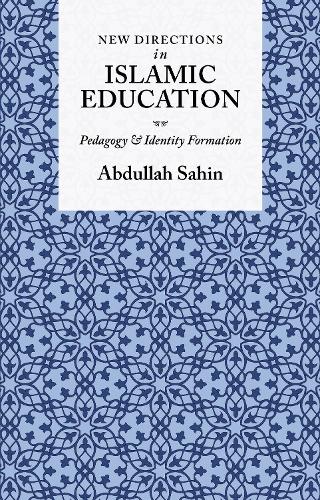
New Directions in Islamic Education: Pedagogy and Identity Formation
(Hardback)
Publishing Details
New Directions in Islamic Education: Pedagogy and Identity Formation
By (Author) Abdullah Sahin
Kube Publishing Ltd
Kube Publishing Ltd
22nd April 2014
United Kingdom
Classifications
General
Non Fiction
Educational: Humanities and social sciences, general
Educational strategies and policy
Islam
Philosophy and theory of education
370.8
Physical Properties
Hardback
300
Width 158mm, Height 234mm
595g
Description
"This ground-breaking book is one of the most significant contributions made in recent years to Islamic education."John M. Hull, University of Birmingham, United Kingdom
New Directions in Islamic Education is a radical rethinking of Islamic education in the modern world. It explores the relationship between pedagogy and the formation of religious identities within Islamic education settings that are based in minority and majority Muslim contexts.
Abdullah Sahin, PhD, directs the Centre for Muslim Educational Thought and Practice and is the course leader for the MEd program in Islamic education at MIHE in Leicestershire, United Kingdom.
Reviews
a timely and highly significant contribution to the ongoing debate about the nature and purpose of Islamic education well-substantiated and linguistically sophisticated This book certainly demands both respect and serious reading and response by educationalists, philosophers, Quranic scholars and statisticians, amongst others... [a] bold attempt to interpret education Islamically and Islam educationally. - British Journal of Religious Education, Bill Gent, Warwick Religions and Education Research Unit, UK "This ground-breaking book is one of the most significant contributions made in recent years to Islamic education and, indeed, to wider religious education. John M. Hull, Honorary Professor of Practical Theology in The Queen's Foundation for Ecumenical Theological Education and Emeritus Professor of Religious Education in The University of Birmingham What makes New Directions in Islamic Education inspiring to practitioners in the field is its combination of empirical analysis of our current malaise, its authentic and intellectually provocative theological grounding, and its practical solutions. Abdullah Sahins seminal work has the potential to set the pace in Islamic education in the coming decades. Edris Khamissa, Director of Al-Falah Islamic College, Durban, South Africa An exemplary work of scholarship which both offers an unparalleled insight into the curriculum and ethos of traditional Islamic seminaries and a way to enable a creative conversation with modern educational theory and practice. Dr Philip Lewis, Peace Studies Department, University of Bradford and author of Islamic Britain (2002) and Young, British and Muslim (2007)
a timely and highly significant contribution to the ongoing debate about the nature and purpose of Islamic education well-substantiated and linguistically sophisticated This book certainly demands both respect and serious reading and response by educationalists, philosophers, Quranic scholars and statisticians, amongst others... [a] bold attempt to interpret education Islamically and Islam educationally. - British Journal of Religious Education, Bill Gent, Warwick Religions and Education Research Unit, UK "This ground-breaking book is one of the most significant contributions made in recent years to Islamic education and, indeed, to wider religious education. John M. Hull, Honorary Professor of Practical Theology in The Queen's Foundation for Ecumenical Theological Education and Emeritus Professor of Religious Education in The University of Birmingham What makes New Directions in Islamic Education inspiring to practitioners in the field is its combination of empirical analysis of our current malaise, its authentic and intellectually provocative theological grounding, and its practical solutions. Abdullah Sahins seminal work has the potential to set the pace in Islamic education in the coming decades. Edris Khamissa, Director of Al-Falah Islamic College, Durban, South Africa An exemplary work of scholarship which both offers an unparalleled insight into the curriculum and ethos of traditional Islamic seminaries and a way to enable a creative conversation with modern educational theory and practice. Dr Philip Lewis, Peace Studies Department, University of Bradford and author of Islamic Britain (2002) and Young, British and Muslim (2007)
Author Bio
Abdullah Sahin: Dr Abdullah Sahin has researched the learning and teaching of Islam within the Muslim majority and minority contexts in the modern world. He directs the Centre for Muslim Educational Thought and Practice and is the course leader for the MEd programme in Islamic Education at MIHE, UK.
